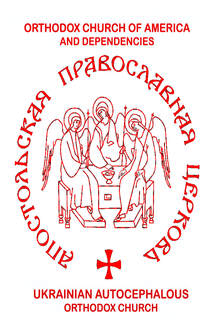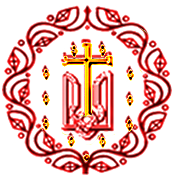28 October 2022
No: 10-28:22
UKASE
REGARDING AUTHORIZED LITURGICAL TEXTS
For Orthodox Christians, Liturgical Texts are not simply the works of outstanding theologians and poets, but also the fruits of the prayerful experience of those who have attained sanctity and theosis. The theological authority of liturgical texts is, in my opinion, higher than that of the works of the Fathers of the Church, for not everything in the works of the latter is of equal theological value and not everything has been accepted by the fullness of the Church. Liturgical texts, on the contrary, have been accepted by the whole Church as a “rule of faith” (kanon pisteos), for they have been read and sung everywhere in Orthodox churches over many centuries. Throughout this time, any erroneous ideas foreign to Orthodoxy that might have crept in either through misunderstanding or oversight were eliminated by Church Tradition itself, leaving only pure and authoritative doctrine clothed by the poetic forms of the Church’s hymns.
Orthodox Liturgical Texts are important because of their ability to give exact criteria of theological truth, and one must always confirm theology using liturgical texts as a guideline, and not the other way round. The lex credendi grows out of the lex orandi, and dogmas are considered divinely revealed because they are born in the life of prayer and revealed to the Church through its Divine Services.
THEREFORE, in keeping within the mainstream of Holy Mother Church, and, on equal status within all Canonical Jurisdictions of Sacred Orthodoxy, we confirm the list of Authorized Liturgical Texts for use within our Blessed Jurisdiction as follows:
EASTERN RITE: The Divine Liturgies of Our Fathers Among the Saints, St. John Chrysostom, St. Basil the Great, St. James of Jerusalem and St. Mark of Alexandria.
WESTERN RITE: The Divine Liturgies of Our Fathers Among the Saints, St. Germanus of Paris, St. Tikhon of Moscow, St. Gregory the Great, Monastic Liturgy of 1977, The Sarum Rite and The Anglican Rite as used by the Antiochian Orthodox Western Rite and ROCOR.
No: 10-28:22
UKASE
REGARDING AUTHORIZED LITURGICAL TEXTS
For Orthodox Christians, Liturgical Texts are not simply the works of outstanding theologians and poets, but also the fruits of the prayerful experience of those who have attained sanctity and theosis. The theological authority of liturgical texts is, in my opinion, higher than that of the works of the Fathers of the Church, for not everything in the works of the latter is of equal theological value and not everything has been accepted by the fullness of the Church. Liturgical texts, on the contrary, have been accepted by the whole Church as a “rule of faith” (kanon pisteos), for they have been read and sung everywhere in Orthodox churches over many centuries. Throughout this time, any erroneous ideas foreign to Orthodoxy that might have crept in either through misunderstanding or oversight were eliminated by Church Tradition itself, leaving only pure and authoritative doctrine clothed by the poetic forms of the Church’s hymns.
Orthodox Liturgical Texts are important because of their ability to give exact criteria of theological truth, and one must always confirm theology using liturgical texts as a guideline, and not the other way round. The lex credendi grows out of the lex orandi, and dogmas are considered divinely revealed because they are born in the life of prayer and revealed to the Church through its Divine Services.
THEREFORE, in keeping within the mainstream of Holy Mother Church, and, on equal status within all Canonical Jurisdictions of Sacred Orthodoxy, we confirm the list of Authorized Liturgical Texts for use within our Blessed Jurisdiction as follows:
EASTERN RITE: The Divine Liturgies of Our Fathers Among the Saints, St. John Chrysostom, St. Basil the Great, St. James of Jerusalem and St. Mark of Alexandria.
WESTERN RITE: The Divine Liturgies of Our Fathers Among the Saints, St. Germanus of Paris, St. Tikhon of Moscow, St. Gregory the Great, Monastic Liturgy of 1977, The Sarum Rite and The Anglican Rite as used by the Antiochian Orthodox Western Rite and ROCOR.
28 October 2022
No: 10-28:22
UKASE
REGARDING AUTHORIZED LITURGICAL TEXTS
For Orthodox Christians, Liturgical Texts are not simply the works of outstanding theologians and poets, but also the fruits of the prayerful experience of those who have attained sanctity and theosis. The theological authority of liturgical texts is, in my opinion, higher than that of the works of the Fathers of the Church, for not everything in the works of the latter is of equal theological value and not everything has been accepted by the fullness of the Church. Liturgical texts, on the contrary, have been accepted by the whole Church as a “rule of faith” (kanon pisteos), for they have been read and sung everywhere in Orthodox churches over many centuries. Throughout this time, any erroneous ideas foreign to Orthodoxy that might have crept in either through misunderstanding or oversight were eliminated by Church Tradition itself, leaving only pure and authoritative doctrine clothed by the poetic forms of the Church’s hymns.
Orthodox Liturgical Texts are important because of their ability to give exact criteria of theological truth, and one must always confirm theology using liturgical texts as a guideline, and not the other way round. The lex credendi grows out of the lex orandi, and dogmas are considered divinely revealed because they are born in the life of prayer and revealed to the Church through its Divine Services.
THEREFORE, in keeping within the mainstream of Holy Mother Church, and, on equal status within all Canonical Jurisdictions of Sacred Orthodoxy, we confirm the list of Authorized Liturgical Texts for use within our Blessed Jurisdiction as follows:
EASTERN RITE: The Divine Liturgies of Our Fathers Among the Saints, St. John Chrysostom, St. Basil the Great, St. James of Jerusalem and St. Mark of Alexandria.
WESTERN RITE: The Divine Liturgies of Our Fathers Among the Saints, St. Germanus of Paris, St. Tikhon of Moscow, St. Gregory the Great, Monastic Liturgy of 1977, The Sarum Rite and The Anglican Rite as used by the Antiochian Orthodox Western Rite and ROCOR.
No: 10-28:22
UKASE
REGARDING AUTHORIZED LITURGICAL TEXTS
For Orthodox Christians, Liturgical Texts are not simply the works of outstanding theologians and poets, but also the fruits of the prayerful experience of those who have attained sanctity and theosis. The theological authority of liturgical texts is, in my opinion, higher than that of the works of the Fathers of the Church, for not everything in the works of the latter is of equal theological value and not everything has been accepted by the fullness of the Church. Liturgical texts, on the contrary, have been accepted by the whole Church as a “rule of faith” (kanon pisteos), for they have been read and sung everywhere in Orthodox churches over many centuries. Throughout this time, any erroneous ideas foreign to Orthodoxy that might have crept in either through misunderstanding or oversight were eliminated by Church Tradition itself, leaving only pure and authoritative doctrine clothed by the poetic forms of the Church’s hymns.
Orthodox Liturgical Texts are important because of their ability to give exact criteria of theological truth, and one must always confirm theology using liturgical texts as a guideline, and not the other way round. The lex credendi grows out of the lex orandi, and dogmas are considered divinely revealed because they are born in the life of prayer and revealed to the Church through its Divine Services.
THEREFORE, in keeping within the mainstream of Holy Mother Church, and, on equal status within all Canonical Jurisdictions of Sacred Orthodoxy, we confirm the list of Authorized Liturgical Texts for use within our Blessed Jurisdiction as follows:
EASTERN RITE: The Divine Liturgies of Our Fathers Among the Saints, St. John Chrysostom, St. Basil the Great, St. James of Jerusalem and St. Mark of Alexandria.
WESTERN RITE: The Divine Liturgies of Our Fathers Among the Saints, St. Germanus of Paris, St. Tikhon of Moscow, St. Gregory the Great, Monastic Liturgy of 1977, The Sarum Rite and The Anglican Rite as used by the Antiochian Orthodox Western Rite and ROCOR.




